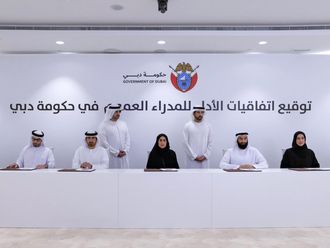Abu Dhabi: The national brainstorming called for and led by His Highness Shaikh Mohammad Bin Rashid Al Maktoum, Vice-President and Prime Minister of the UAE and Ruler of Dubai, has used a ‘crowdsourcing’ approach that relies on the ‘wisdom of crowds’ — the idea that the collective wisdom of the many can often outperform the problem-solving of a gifted few, a leading creativity specialist told Gulf News yesterday.
“Asking the whole country to participate in this process ensures a wide representation of the populace,” said Dr Mark Batey, Creativity Specialist and Joint Chair of the Psychometrics at Work Research Group at Manchester Business School. “Furthermore, everyday people are likely to be familiar with, concerned about and close to the everyday problems and opportunities in education and healthcare.”
Dr Batey said there is no better way to engage people, be it at work or in everyday life, than to ask them to take part in problem solving — this initiative is an excellent opportunity for people to be engaged with the key issues of government.
“One of the most important issues around brainstorming is creating the right environment for creativity,” he said. “The tweets sent by Shaikh Mohammad are an open invitation to his people to get involved. He has given a very public mandate that he wants the people to engage in the brainstorm. The response rate of 65,000 ideas shows that they have listened. Shaikh Mohammad has continued to encourage participation by tweeting again — ‘many excellent ideas were received…’”
Positive example
Dr Batey said so many organisations and governments struggle to cultivate and capture creativity, but the example of this national brainstorming session can be a powerful lesson from which we can all learn.
On how to taking this initiative forward with positivity, Dr Batey advised to keep encouraging new ideas – we often develop our best ideas after we have had our first thoughts. Keep pushing beyond these to produce even better ideas.
“Ministers should be encouraged not to evaluate the ideas too quickly or too harshly,” he said. “Try to avoid simplistic ‘yes’ versus ‘no’ evaluation. All ideas can add to the problem solving process. Often ‘bad ideas’ contain many useful elements.”
Dr Batey also suggested to ministers to pay special attention to the more unusual ideas and suggestions. “They will not be direct solutions to the problem, but will contain vital insight into people’s needs and motivations. When these are taken into account they will help to develop the very best possible solutions,” he said.
Wisdom of crowds
Dr Batey explained this may not work for all circumstances, but they could use the wisdom of crowds to evaluate the suggestions too. This is a similar approach to how Google evaluate ideas internally. A simple voting system would see the ideas that resonate with people rise to the top of the pile. Of course, we would still be reliant on the wisdom and expertise of our leaders to evaluate, interpret and implement the popular suggestions.
“Many of the organisations we work with find it difficult to encourage and manage creativity, perhaps they might learn a lesson or two from this exciting national brainstorming initiative,” Dr Batey said.












